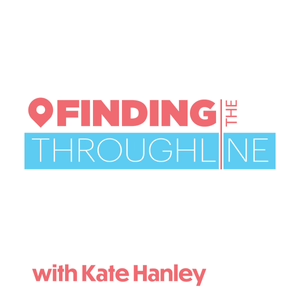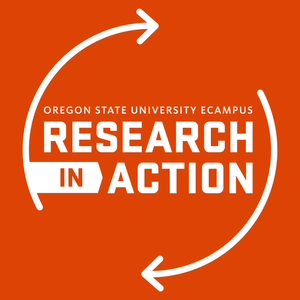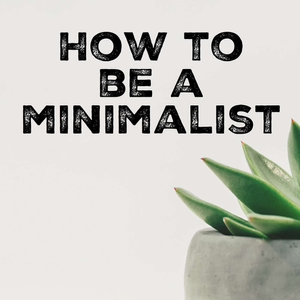
BONUS: The "HumanCharger" - A Revolutionary Light Therapy Device For 'Creatives' Who Live In the Dark
08/29/17 • 56 min
If you're a "creative professional" the chances are extremely high that you live in the dark. As a film editor, I have to spend all day in a dark room...it's just a requirement of the job. And while many people in my profession like to joke about occasionally exposing themselves to that "funny glowing ball in the sky," there's nothing funny about the long term effects of not getting enough exposure to light (anxiety, depression, and burnout being on the short list). But if your career requires you to live inside a dark room all the time, there's nothing that can be done, right? Not so fast. Thanks to a new light therapy device called The "HumanCharger" (use the coupon code 'OPTIMIZE' for 20% OFF), even if you have no opportunity to get outside during daylight hours you can still reap the mental and physical benefits you would receive from exposure to the sun....but in 12 minutes a day via...earbuds? Yes, the HumanCharger is a device no larger than an iPod Nano, but rather than emitting sound, the earbuds emit full spectrum UV-free white light that is absorbed by photo-sensitive proteins in your brain. No, this isn't the future - intracranial light therapy...is real. In the interest of full disclosure and transparency, this is a VERY new science and much is unknown about why this treatment works (and if it does even work at all). But when it comes to anything that could improve my well-being while stuck in a dark room, I'm happy to be an early adopter knowing there is little downside with tremendous potential for upside, assuming this device and type of light therapy are truly legit.
DOES THIS THING ACTUALLY WORK?
I'll admit I was über skeptical when I first discovered this device, and frankly I thought it could just be a scam. But given that I discovered it from one of my most trusted health & biohacking resources Ben Greenfield who swears by his HumanCharger, I figured if I gave it a try the worst that would happen is it totally sucked (or my brain would melt...but that was a remote possibility). However, if it actually lived up to its promise of improving energy levels, increasing mental alertness, and lifting mood by simply using it 12 minutes a day in the morning, the best thing that would happen is finally having a solution to my desperate need for more sunlight during the day. And since I wasn't required to ingest anything, even if it was just the placebo effect, who cares? I would still feel better. Given that I was about to begin a two month long marathon editing a tv pilot for 12+ hours every day in a windowless room, I decided to take a chance and test out the HumanCharger for 4 weeks, and convinced my tech advisor and fellow editor Adam Bedford to test it out as well. According to Adam, "My first impression was that it was just a weird looking iPod. I thought it played soothing sounds. Imagine my surprise when the earbuds lit up!" After using it every 3 hours between 7am and 8pm (each session is 12 minutes) for 30 days, Adam's initial reaction was a slight increase in focus and energy which lasted for about an hour or so. But after the end of week two, Adam said:
"My energy levels had risen considerably along with my ability to focus. Overall I felt a lot calmer the second week and the energy boost after each session lasted longer."
Once the 30 day trial period was complete and Adam stopped using the device he said he didn't experience any withdrawal symptoms, but what he did notice was how different he felt when he didn't use the device consistently. "My sleep had improved from 5-6 hours per night to 7-8 hours during the 4 week test, but shortly after finishing my 30 days I was back to 5-6 hours per night." As far as my own experience, I'll admit I picked a very bad time to test this device without other external variables having an effect on the outcome. I was making significant changes to my diet and exercise routines, I was also battling a major case of depression, anxiety, and burnout (which I'll post more about soon). To say the effects I felt from using the device consistently for 8 weeks were solely from the HumanCharger would be irresponsible. But in short, I too noticed a slight increase in focus during the da...
If you're a "creative professional" the chances are extremely high that you live in the dark. As a film editor, I have to spend all day in a dark room...it's just a requirement of the job. And while many people in my profession like to joke about occasionally exposing themselves to that "funny glowing ball in the sky," there's nothing funny about the long term effects of not getting enough exposure to light (anxiety, depression, and burnout being on the short list). But if your career requires you to live inside a dark room all the time, there's nothing that can be done, right? Not so fast. Thanks to a new light therapy device called The "HumanCharger" (use the coupon code 'OPTIMIZE' for 20% OFF), even if you have no opportunity to get outside during daylight hours you can still reap the mental and physical benefits you would receive from exposure to the sun....but in 12 minutes a day via...earbuds? Yes, the HumanCharger is a device no larger than an iPod Nano, but rather than emitting sound, the earbuds emit full spectrum UV-free white light that is absorbed by photo-sensitive proteins in your brain. No, this isn't the future - intracranial light therapy...is real. In the interest of full disclosure and transparency, this is a VERY new science and much is unknown about why this treatment works (and if it does even work at all). But when it comes to anything that could improve my well-being while stuck in a dark room, I'm happy to be an early adopter knowing there is little downside with tremendous potential for upside, assuming this device and type of light therapy are truly legit.
DOES THIS THING ACTUALLY WORK?
I'll admit I was über skeptical when I first discovered this device, and frankly I thought it could just be a scam. But given that I discovered it from one of my most trusted health & biohacking resources Ben Greenfield who swears by his HumanCharger, I figured if I gave it a try the worst that would happen is it totally sucked (or my brain would melt...but that was a remote possibility). However, if it actually lived up to its promise of improving energy levels, increasing mental alertness, and lifting mood by simply using it 12 minutes a day in the morning, the best thing that would happen is finally having a solution to my desperate need for more sunlight during the day. And since I wasn't required to ingest anything, even if it was just the placebo effect, who cares? I would still feel better. Given that I was about to begin a two month long marathon editing a tv pilot for 12+ hours every day in a windowless room, I decided to take a chance and test out the HumanCharger for 4 weeks, and convinced my tech advisor and fellow editor Adam Bedford to test it out as well. According to Adam, "My first impression was that it was just a weird looking iPod. I thought it played soothing sounds. Imagine my surprise when the earbuds lit up!" After using it every 3 hours between 7am and 8pm (each session is 12 minutes) for 30 days, Adam's initial reaction was a slight increase in focus and energy which lasted for about an hour or so. But after the end of week two, Adam said:
"My energy levels had risen considerably along with my ability to focus. Overall I felt a lot calmer the second week and the energy boost after each session lasted longer."
Once the 30 day trial period was complete and Adam stopped using the device he said he didn't experience any withdrawal symptoms, but what he did notice was how different he felt when he didn't use the device consistently. "My sleep had improved from 5-6 hours per night to 7-8 hours during the 4 week test, but shortly after finishing my 30 days I was back to 5-6 hours per night." As far as my own experience, I'll admit I picked a very bad time to test this device without other external variables having an effect on the outcome. I was making significant changes to my diet and exercise routines, I was also battling a major case of depression, anxiety, and burnout (which I'll post more about soon). To say the effects I felt from using the device consistently for 8 weeks were solely from the HumanCharger would be irresponsible. But in short, I too noticed a slight increase in focus during the da...
Previous Episode

BONUS: Take Your Standing Workstation to the Next Level with the 'Topo Mat'
The standing desk revolution is upon us, but the number one complaint I hear from those who convert is that the transition is painful, and standing for long periods of time can get uncomfortable very quickly. After years of searching for a solution for myself, I have finally solved these problems thanks to the Topo Mat. This is the best anti-fatigue mat I've ever used. It's literally like a playground for your feet! In this bonus podcast episode I have re-released my in-depth conversation with Kit Perkins and Ryan Feeley, the designers of the Topo mat and the CEO and CTO, respectively, of ErgoDriven. We talk about the inspiration for creating the Topo mat, why it isn't just another anti-fatigue mat, and how it promotes more activity throughout the day (and alleviates the pains associated with chronic standing). Note: This interview was originally recorded right after I first tested my Topo Mat (and you'll see very quickly that I didn't even know how to properly pronounce it yet!).
Want to Hear More Episodes Like This One?
» Click here to subscribe and never miss another episode
Here's What You'll Learn:
- Kit and Ryan's respective backgrounds as engineers
- Your body as a machine
- On their passion for changing the standing workstation
- Where did Topo originally come from?
- Why a standing workstation should promote movement but usually doesn't (unless you know how to do it correctly)
- The research phase and how the product was designed
- Standing can cause just as many health problems as sitting
- Movement is essential!
- The prototype phase and how the Topo mat came to be
- Testing Topo on the masses (video: Flat mat vs. Topo)
- How the design of Topo keeps you moving and helps promote good posture
- The issues with standard anti-fatigue mats
- The half-sphere in the middle...what the heck is it and what do you do with it?
- The texture of the mat and what they are improving in the future
- How we started sitting so much and what it is doing to our health
- You need a good sitting to standing transition plan (Here's a great place to start)
- How do I start using Topo? Stand on it and see what happens next...you'll be hooked!
Useful Resources Mentioned:
Learn more about the 'Move Yourself' programPurchase your Topo MatLeave a review of the 'Optimize Yourself' podcast to WIN a Topo MatQuittingSitting.comVascular Hemodynamics for DummiesThe Standing Desk CalculatorThe Topo BlogMove Your DNA by Katy BowmanHow Is Sitting Bad For You?
Guest Bios:
Kit Perkins | CEO Kit is a mechanical engineer by degree, and a self-taught entrepreneur, growth hacker, and web developer. With a strong interest in human design and its implications to guide his thirst for knowledge and get-stuff-done mentality, Kit is determined to make the world a healthier, more productive place for everyone. Ryan Feeley | CTO Ryan has a PhD in Mechanical Engineering from UC Berkeley. As a brilliant engineer and burgeoning scientist, Ryan leads product development and validation. On the weekends, you can find him sprinting barefoot and shirtless in his local parks, with myriad home-brew sensors quantifying his body.
Show Credits:
This episode was edited by Curtis Fritsch, and the show notes were prepared and published by Jakin Rintelman. Special thanks to
Next Episode

Understanding the Link Between Creativity and Depression | with Dr. Edison de Mello
Creativity and mental health issues go together like peanut butter and jelly...or do they? According to the"Mad Genius Paradox," that may not be as true as we think. In the inaugural episode of the Optimize Yourself podcast I dive deep into the connection between creativity and mental health with Dr. Edison de Mello, the founder of the Akasha Center for Integrative Medicine in Santa Monica, CA. Dr. D is one of the foremost experts in the country in integrative medicine and is literally one of the people who wrote the book on becoming board certified in this field. He is also the reason I’m still alive today, which you’ll learn more about more in this episode. Being a self-proclaimed workaholic I’ve fought my share of depression and burnout for two decades now, and it was very important to me for Dr. de Mello to be my first guest because I’ve discovered how rampant mental health issues are in creative fields like mine, and more importantly how difficult it is for people to reach out and ask for help because of all the stigmas that come with depression and burnout. If you’ve ever felt like you’re broken, weak, or that there’s something wrong with you, I ask you to please reconsider after listening to this conversation, because you are none of those things. Not only are you not broken or weak, if you work in a creative industry, what you are experiencing is not the exception, it’s most likely the rule. Dr. D. and I are going to help you understand what you are battling both emotionally and biologically, and more importantly, the steps you can take to get better for the long term. Balancing yourself is a fundamental component of the Optimize Yourself program, and I hope this episode helps you find some balance in your own life.
Want to Hear More Episodes Like This One?
» Click here to subscribe and never miss another episode
Here's What You'll Learn:
- The complex relationship between creativity and mental health
- How to become the most authentic version of yourself
- Eliminating the stigma of depression
- The life-saving work of Dr. Edison de Mello
- The cyclical nature of depression and anxiety
- Cultivating an awareness of your body’s stress language
- The danger of placing identity within work
- How you can take ownership of your wellness and rewrite your story
- The interpersonal importance of bodily care
- You can measure depression and anxiety no different than diabetes
- Depression’s physiological influences
- Fighting narratives of brokenness and weakness
- How to have a productive relationship with your practitioner
- Finding a doctor that gets to know you before he gets to know your symptoms
- Circadian rhythms and hormonal optimization
Useful Resources Mentioned:
The Akasha Center For Integrative Medicine
Akasha Naturals Supplements Store
Our Generous Sponsors:
This episode is made possible by Ergodriven, the makers of the Topo Mat, my #1 recommendation for anyone interested in moving more at their height-adjustable workstation. Listen, standing desks are only great if you’re standing well, otherwise you’re constantly fighting fatigue and chronic pain. Not like any other anti-fatigue mat, the Topo is scientifically proven to help you move more throughout the day which helps reduce discomfort and also increase your focus and productivity. And they’re really fun and a great conversation starter.
Guest Bio:
Edison de Mello, MD, PhD, is a board certified Integrative Physician by the American Board of Integrative Medicine and a licensed psychotherapist by the California Board of Behavioral Sciences. He practiced psychotherapy for 13 years before entering medical training and now practices and teaches evidenced- based integrative medicine. Dr. de Mello’s PhD dissertation, entitled “Gut Feelings – A Psychosocial Approach to Gastrointestinal Illness,” inspired his conception of a center where psychology would be combined and fully integrated with Western and Eastern medicines. The de Mello Institute was formed in 1996 with the goal of employing safe and complementary approaches to healthcare while also addressing a person’s emotional and spiritual health. Fully committed to these goals, Dr. de Mello entered residency in 1999 at the prestigious Albert Einstein College of Medicine at Beth Israel Medical Center U...
If you like this episode you’ll love
Episode Comments
Featured in these lists
Generate a badge
Get a badge for your website that links back to this episode
<a href="https://goodpods.com/podcasts/the-zack-arnold-podcast-80416/bonus-the-humancharger-a-revolutionary-light-therapy-device-for-creati-4301717"> <img src="https://storage.googleapis.com/goodpods-images-bucket/badges/generic-badge-1.svg" alt="listen to bonus: the "humancharger" - a revolutionary light therapy device for 'creatives' who live in the dark on goodpods" style="width: 225px" /> </a>
Copy





